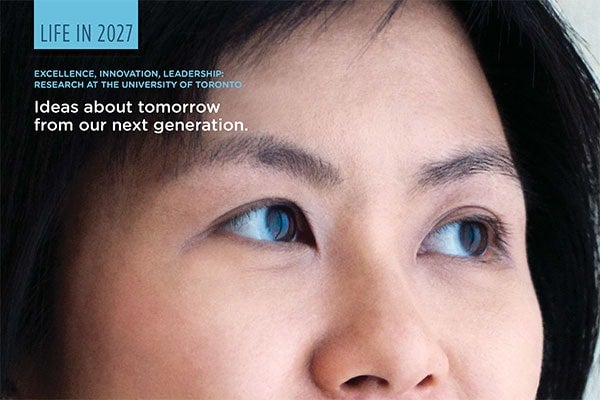
Answering the challenges of life in 2027
Published: June 19, 2013
What does the future of computer interfaces hold? Is there life on other Earth-sized planets? How can we rethink the built environment we currently occupy?
Those are just a few of the many challenging questions University of Toronto researchers are working to solve within the next 15 years. The initial findings of 16 featured professors are highlighted in the 2012 U of T annual research report entitled Life in 2027. (Read the report.)
“University of Toronto researchers cannot predict the future,” writes Professor Paul Young, vice-president, Research, in the report. “Through the collective force of 5,000 of the world’s brightest scholars, however, we are working on the knowledge it will take to deal with the future.”
Life in 2027 demonstrates how U of T has been successful in promoting the university’s research output while highlighting the impressive work of the faculty.
“The researchers we featured represent the next generation of scientists and scholars who will be among those leading progress on the challenges we all face now,” says Paul Fraumeni, Research communications director. “We chose the year 2027 to highlight how research today might impact tomorrow as U of T enters its third century of operation.
“It’s important to realize that the research and scholarship that is conducted at U of T is about what’s going on around the world.”
The publication was recently recognized with a silver CASE award (research publication/print category). CASE – the Council for Advancement and Support of Education – is an international association of educational institutions which promotes the advancements of educational institutions and the importance of education worldwide. (Read about CASE.)
Stories such as those found in Life in 2027 help raise awareness about U of T’s commitment to changing the world for the better, says Fraumeni.
“By telling people what U of T researchers and scholars are doing, we are helping people to understand the world," he says. "Think of a few topics that are in the public conversation right now – Syria, Turkey, social housing, bullying, climate change, breast cancer, mental health, privacy, for example – and U of T researchers are examining these topics and creating new knowledge about them.”
U of T also found success in several other CASE award categories, including three bronze awards: Student Poster Campaign (advertising), Asia Pacific Gala (design innovations) and the Winter ’13 edition of U of T Magazine (design cover).
The transit of Venus event held last summer took the bronze in the individual special event category and the silver in the PR and Community Relations Projects category. (Read about the event.)
In addition to the CASE awards, U of T also fared well with the Canadian Council for the Advancement of Education (CCAE) awards, which include:
Bronze for the Boundless website in the category Best Website
Gold for the Student Poster campaign ("We've got a club/course for that") in the Best Poster category
Silver for UofT Magazine in the category Best Magazine
Silver for the article titled Frye's Anatomy in the category Best Writing
Bronze for the article titled Escaping Gridlock in the category Best Writing

